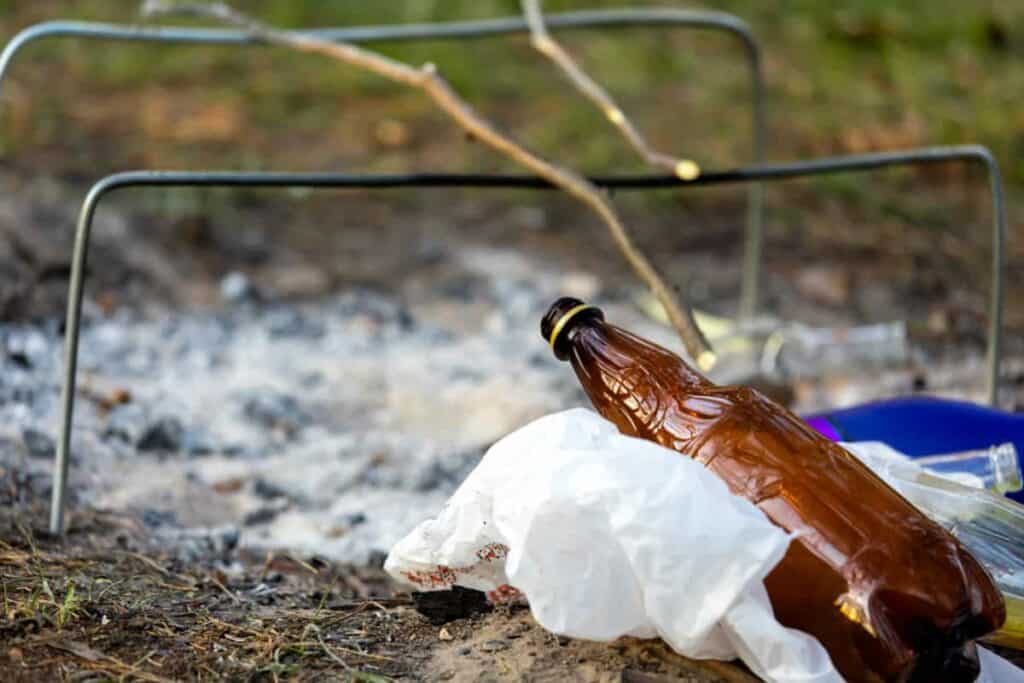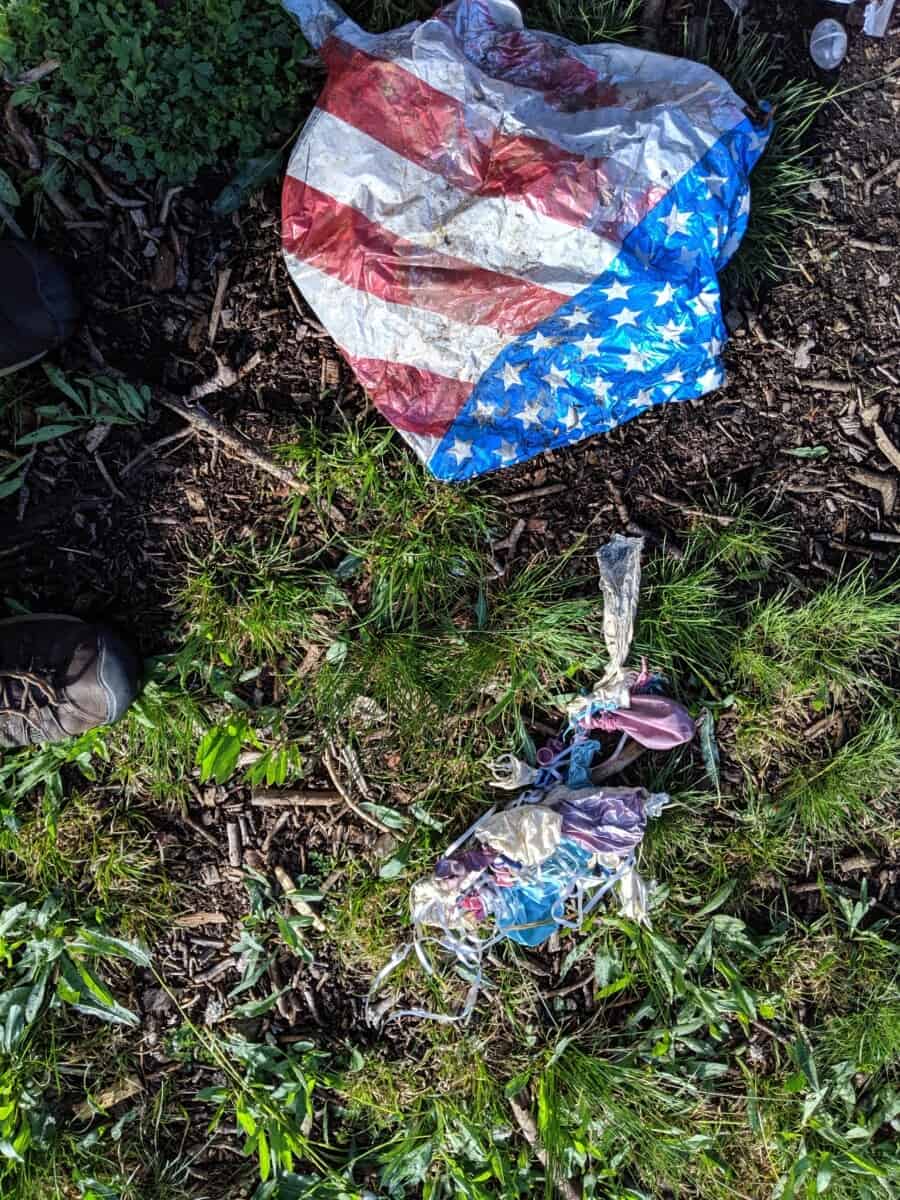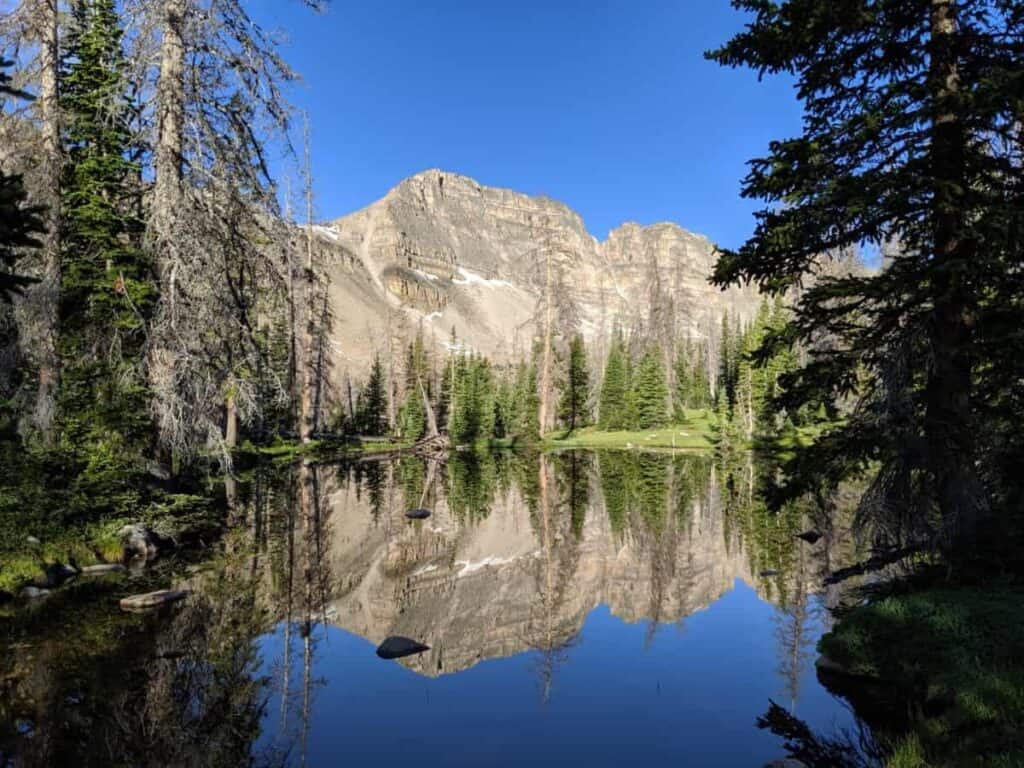In this current day, there are a lot of impacts to the environment caused by humans, and your camping plans just might be adding to them.

But don’t fear, there are ways you can minimize your effect on the environment while enjoying the outdoors. From picking up trash to following Leave No Trace principles, camping fun is possible while protecting nature. And better yet, follow some of our advice and you might just be leaving your favorite camping spot looking a little better for your stay.
Fire pits
Some of the oldest evidence of human habitation comes in the form of fire pits. So even though that little fire ring doesn’t look very enduring, the evidence of it may be there for a millennia or more. How is that for leaving a mark in the environment?
By the way, as an Amazon Associate, I earn when buying qualified products through links on my site.
There isn’t much you can do about already scorched or fire broken stones, so you need to focus on the immediate effect of fire pits, the largest of which is the potential to cause a fire. A few forest fires are sparked naturally by lightning strikes, but humans cause a majority with the largest culprit being sparks or coals from campers.
Another problem with fire pits is, well, the act of gathering the material to have a fire. Often established campsites will be devoid of deadwood, will have branches from trees cut off and even live trees cut down. “Proactive” campers may bring wood from home or other non-local areas, potentially introducing insects and diseases to new areas.
What You Can Do:
The first is you can choose not to have a fire. Sure, a campfire is nice, and there is just something about being outdoors that makes you feel like you need to have one. But if you look around and see an already abused area with no easily found firewood, forgo the pleasure unless you can find a local source to buy wood from.
Also, when starting a fire, don’t pull bark off of trees. Sure, some tree species make excellent kindling, but just like too many branches picked clean to start a fire, too much bark removed isn’t healthy to the tree and impacts the tree’s ability to grow and fight off insects and disease.
Always keep your fires a manageable size. Flames should not be more than two feet high, and one foot above the wood is far more reasonable. This will make your firewood last longer and keep any wind gusts from sending flames and sparks farther than you intended.
Before you light a fire, clean out the existing fire ring if it is full of ash. Scatter old and cold ash through the woods; do not dump it in a pile or water. While having a fire, do not burn debris, plastic, or glass. Before going to sleep or leaving the campsite, douse any remaining embers and coals thoroughly with water. Do not leave them smoldering overnight and do not bury them, as this can make the coals last longer, eventually catching something else on fire.
And lastly, do not make new fire rings. If you are camping in a spot without a fire pit, just don’t have a fire. Creating a new ring will not only encourage future use, creating a new, established campsite, but the marks of it will remain for thousands of years.
Trash
One of the first signs to know someone has been to a spot before you is to see debris on the ground. There is nothing more spoiling of a sense of wilderness and nature than beer cans or wrappers littering the forest floor. But those are just the quickly seen bits of trash.
We were camping at an established community campground that was pretty neglected. There were so many nails in our fire pit it looked like someone had burned a house in it. Besides the ugliness of all that metal and the fact we ended up with a spike in our tire despite being careful, really it was a huge distraction from another problem: fishing line.
Our scavenger of a dog walked around sniffing for something tasty while we dealt with the bucket load of nails. The next thing we knew, we looked up, and he had a length of fishing line dangling from his mouth. It had smelled like fish to him.
While I’ll save you from the terror of trying to determine if he’d swallowed a hook, how to be sure, how to get the line out of his esophagus, and what it would do to his gut if we didn’t (not good things), I’ll just end that he is fine, and we now go around and collect those unseen bits that anglers leave on the ground or are caught in trees. Fishing line isn’t just a threat to our pets, it entangles birds and fish as well as other creatures, cutting through their flesh or guts and causing death.
What You Can Do:
Always follow the saying, “pack it in, pack it out.” Carry trash bags with you and pick up all debris that you come across from cans to wrappers to even fishing line and cigarette butts. It doesn’t belong in nature and can harm something if left. While camping, don’t leave any waste, including biological. Eggshells and coffee grounds may decompose, but they will also attract wildlife. You don’t want animals to associate campsites or people with tasty smells and food.
While camping, walk along shorelines to look for trash that washes up and do your best to clean it up. Balloons are another object that you’ll often find in remotes areas. We’ve cleaned up what looked like an entire engagement party’s worth of helium balloons from a remote camping spot on Lake Mead. Keeping the woods clean starts at home by not launching debris into the waterways and air.

Human Waste
If you are camping, it inevitably is going to happen. You are going to need to use the bathroom when there is no facility nearby. When you pull into a remote camping site, there is no bigger turn off than stepping out of your car and into … well, you know. The smell and sight of scattered toilet paper and feces are bad enough, but what is worse is the potential bacteria that can make you seriously ill.
What You Can Do:
There is no way not to have to go to the bathroom, so you need to do it responsibly. Dig a shallow hole or trench, deposit your business in it, and then re-cover with soil. Be sure not to leave toilet paper out; it lasts longer in the environment than you realize. Or you can carry a porta-potty with you. There are a multitude of small and collapsible units that store easily as well as ones that use something called a “wag bag,” that forms a solid gel (instead of that nasty smelling blue liquid that goes everywhere). You simply seal the bag and toss it in a dumpster.
Also, it is always a good idea to carry hand sanitizer. Use it before eating and cooking, because you never know exactly what you just put your hand on in the woods.
Soil Damage
From erosion to compaction, the soil takes a beating from our use. Camping is no exception. Paths to areas like water sources and toilets quickly become mud or erode into nearby streams and lakes. Parking areas compact under the weight of cars. Shorelines are damaged as people remove rocks for fire rings. Even overuse of tent spots can create a hard surface that quickly puddles water just where you don’t want it during a rain storm.
What You Can Do:
Do your best to camp on durable surfaces such as rock, sand, or stone. Camping on moss and grass might sound lovely, but you are damaging the plants that hold the soil in place and keep it from becoming something as hard as concrete.
Always try to park on hard surfaces as well, even it if means walking to your camping spot.
Don’t remove stones, especially from shorelines or banks and slopes.
Stay on established trails and don’t create new paths even if existing ones are in poor shape. New trails without revegetation of old pathways will just cause new erosion points.
Keep your footprint as small as possible. Use a small tent with the minimum number of stakes needed to hold it down. If you can anchor it with rocks, that is even better. The less you spread out and walk around, the better it will be for the soil and plants where you are camping.
Natural Habitat Spoilage
Most of us go camping to enjoy nature and get away from urban areas, but when people have been there before you and not been careful, the experience can quickly be ruined. Trash destroys the aesthetics of a place as well as impacts the wildlife. Overuse of trails and campsites create mud and erosion that is no fun to hike through and can damage water sources. Broken branches, cut trees, and opening up of areas that should be forested ruins the wilderness feel as well as the ecology of an area. The noise from other campers can also quickly dispel any sense of peace.

What You Can Do:
- Clean up your trash and any you find.
- Don’t break tree branches for kindling or roasting sticks
- Don’t cut down trees or open up areas to make camping easier
- Respect nature and other campers by not making excessive noise. This means shouting, loud radios or music, noisy generators, or leaving your car running. Noise carries a long way, even in the woods. If you camp on a lake, sound can easily travel several miles.
Over Visitation
Related to natural habitat spoilage is over visitation. Instagram and other social media platforms have created a fantastic way to share amazing places as well as a nightmare of attracting more people than an area can handle. Whether it is the bumper to bumper traffic that snarls visitors in Yellowstone National Park or the lines of people waiting for their turn to get the perfect selfie at a mountain top in New Zealand, too many people can ruin a place.
What You Can Do:
Before you post that picture on Instagram, ask yourself what it would look like if fifty people showed up? Can the site contain more visitors? Will the environment suffer? If so, consider not posting about the epic place you’ve found or at least turning off the location tag.
When traveling, look for off-season times and visit then, if you can. And sometimes, you just have to skip a place you really want to see. I’ve wanted to visit Yosemite for years, but between the booked reservation system, the wait to get in, and the traffic backup, I haven’t because I know I will be disappointed. Sometimes the best way to protect beautiful places is not to go see them.
Feeding Wildlife
I’ve spent months in the Yukon and Alaska, seeing massive brown bears as well grizzlies. One walked by the camper while we slept. But the closest and most dangerous encounter I’ve had with a black bear wasn’t in the Northwest Territories; it was in Pennsylvania on the New Jersey border.
A three hundred pound black bear wandered out of the woods while I was making breakfast. It wouldn’t go away. My husband yelled at it, threw rocks, banged pots. It circled the campsite for an hour while we decided that if it wouldn’t leave, we would.
It had become familiar with campers and food, and it wanted a free meal. Most likely, this bear will have to be relocated, but relocation is costly and often doesn’t work. Is there any place to take wildlife without people nearby? Most likely, it will be killed as a “nuisance” animal because people had been feeding it, thinking it was great to see such a massive bear up close.
What You Can Do:
Don’t feed wildlife. Don’t ever feed wildlife. Also, don’t leave your trash outside where it will attract animals, clean up your campsite after cooking, don’t leave your stove out after you are done with it, and don’t toss scraps or things like coffee grounds into the bushes around your site. These things will attract wildlife just the same as actually feeding the animals.
If you are in a campsite that has bear boxes for storing food, use it. If you travel through wildlife areas a lot and like to freedom camp, consider buying bear-proof containers for storing your food. And wildlife isn’t limited to just bears. From raccoons to mice, creatures want to find a way into our stuff. Keep things clean, and if traveling in high use areas, use facilities designed to keep the impacts of food on wildlife minimized such as rodent hangers.
For more details on safe and effective food storage, check out our article on avoiding bears getting into your car here.
Pets and the Environment
We travel with our small cairn terrier and are at once annoyed by the number of trails and even campgrounds that do not allow dogs and understanding. Dogs can chase wildlife. Dogs and dog food can attract predators. They might poo somewhere that is less than pleasant for the next person. They dig holes to lie in, causing soil erosion.
What You Can Do:
- Don’t leave food down all the time for your pet
- Feed only under supervision or inside a tent or car
- Store food in an airtight/smell proof container
- Pick up after your pet
- Don’t let your pet dig a hole
- Don’t allow your pet to chase wildlife
- Don’t let your pet run into the woods off leash (you might not see them again)
What about Freedom Camping (Boondocking) and the Environment?
Freedom camping is something great to experience. There are apps to help you find the next great hidden spot to sleep as well as places to travel where there are no campgrounds, and pull-offs will be your best friend. But sometimes it can go too far.
I’ve been to BLM land in the USA that was simply trashed. Roads looped everywhere with minimal natural area left. Trash and fire pits were a driving hazard, appearing at random. Any existing toilets were broken from walls to fixture. It looked like a post-apocalyptic war zone.
Is this what freedom camping will become?
What You Can Do:
If you like to boondock or freedom camp, utilize apps to help you find established camping sites where it is legal to set up overnight. Pack out any trash, including any you find. Don’t have large fires or loud parties. You aren’t as alone or isolated as you think and noise carries a long way. Plus large bonfires that look out of control might be threatening to someone’s house just a couple of miles away. These free camping spots are quickly shut down when they are abused, so to keep them open do your best to be respectful and helpful.
Don’t create new spots or, if you camp somewhere that is undeveloped, don’t create a campsite. Sleep in your car or on a durable surface, so you don’t compact the soil or kill plants. Don’t create a fire ring. Use a camp stove to make your meals and take all debris with you. It should look like you were never there.
What are Ways to Protect the Environment While Camping?
You are on the planet, and you want to enjoy nature. There is nothing wrong with that! But you should do your part not just to minimize your visit but also lessen any impact humanity has had on the environment. Human population’s reach has grown too big to simply clean up after yourself.
Follow the principles of such groups as Tread Lightly and Leave No Trace. Treat any place you stay like it is your home. Or better, your parent’s home who’ll ground you for the next year if they come back and find you trashed the place. Do your best always to leave a site better than you found it.
If you do run into a site that needs a serious amount of attention, google local conservation groups and let them know. And, it wouldn’t be a bad idea to donate some time or money to help them out.
